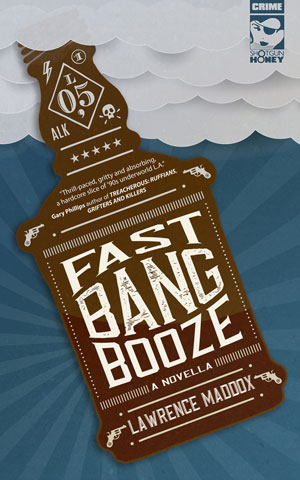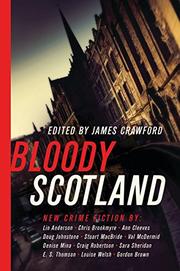"Fast Bang Booze," by Lawrence Maddox, Shotgun Honey, 2018.
Lot of housekeeping to get through today, so bear with me.
1. My friend Lawrence Maddox is making his second appearance in this column. He sent me a free e-copy of this book, which includes the title piece and another story.
2. If you published (or were published in) a book of mystery stories this year, you can send me a free copy if you want, just like Maddox. I promise to start reading it. If it's the best story I read that week I'll review it here. Contact me for instructions.
3. Is this a short story? What's the defining factor? The classic definition is fiction that you can read in one sitting. It would take a lot of sitzfleisch to read some of the stories at the end of this list in one round. Another definition used to be that it was something too short to publish as a book, but e-books can work at any length. This one is 25,000 words, which is long for a novella, short for a novel. I'm going to review it. If you disagree with my verdict, as I have said before, get your own blog.
4. (Trust me, we're getting closer.) I'm sure you have heard or read someone say that in a dangerous situation it felt like time slowed down. A few years ago a scientist decided to test this concept. How could he do that? Well his hypothesis was that when it felt like time was slowing down what really happened was that the brain sped up. He found a clever way to test that and alas, found that it wasn't true.
Why am I bringing this up? Because for Frank, the narrator of Fast Bang Booze, it's true. His nervous system really does work faster than everyone else. For example, he can see a punch coming and get out of the way. That makes him a heck of a driver, and good in a fight. Unfortunately it also makes his voice come out as a "schizoid turkey gobble."
He can slow his brain down with a depressant, i.e. alcohol, which allows him to talk like a normal person. But then he loses his, well, super powers, too. What a dilemma.
As this tale starts, he is being discovered by Popov, a Russian gangster who decides such a fast fighter would be a useful addition to his crew. Popov is arranging that noir cliche, One Last Job, in this case a drug deal which will make him or break him. This being noir, a whole lot of people and things will get broken, shot, tied up, crashed, stolen, drugged, whipped, etc. It's a wild ride and it reads a lot faster than 25,000 words sounds.
Sunday, May 27, 2018
Sunday, May 20, 2018
10,432 Serial Killers (in Hell), by Emily Devenport
"10,432 Serial Killers (in Hell)," by Emily Devenport, in Alfred Hitchcock's Mystery Magazine, May/June 2018.
Let me start out by saying the last few issues of AHMM have had outstanding cover art. Truly.
It's hard enough to write a good crime story. Some people choose to increase the degree of difficulty by adding fantasy elements. Now you're trying to satisfy the strictures of two genres, and you know some people will reject your tale because they only enjoy one of them. So if you try it, you better know what you're doing.
Devenport, obviously, does.
The story begins with a bus driver spotting a "white lady hurrying toward her empty bus at eleven thirty night. The lady had pajamas on under her bathrobe and big, fat slippers on her feet, which explained why she couldn't break into a run." She also had a small dog under one arm, and a cat under the other.
Obviously a comic situation. But Katie Thomas is in a serious mess. She is running away from "the serial killer in my apartment." His name, she says, is John Fogus and they met in Hell.
Say what?
Katie explains to an officer: She had been in a car accident two years earlier and was dead for thirty seconds. She spent that time in Hell, where she met 10,432 serial killers.
"That's a lot of people, Katie."
"They were all in one place together."
"Kind of like a stadium setting?"
"Kind of."
So Katie is obviously crazy. Except someone did break into her apartment and left hints that tied him to unsolved killings.
A fun story which even offers an interesting take on Hell.
Let me start out by saying the last few issues of AHMM have had outstanding cover art. Truly.
It's hard enough to write a good crime story. Some people choose to increase the degree of difficulty by adding fantasy elements. Now you're trying to satisfy the strictures of two genres, and you know some people will reject your tale because they only enjoy one of them. So if you try it, you better know what you're doing.
Devenport, obviously, does.
The story begins with a bus driver spotting a "white lady hurrying toward her empty bus at eleven thirty night. The lady had pajamas on under her bathrobe and big, fat slippers on her feet, which explained why she couldn't break into a run." She also had a small dog under one arm, and a cat under the other.
Obviously a comic situation. But Katie Thomas is in a serious mess. She is running away from "the serial killer in my apartment." His name, she says, is John Fogus and they met in Hell.
Say what?
Katie explains to an officer: She had been in a car accident two years earlier and was dead for thirty seconds. She spent that time in Hell, where she met 10,432 serial killers.
"That's a lot of people, Katie."
"They were all in one place together."
"Kind of like a stadium setting?"
"Kind of."
So Katie is obviously crazy. Except someone did break into her apartment and left hints that tied him to unsolved killings.
A fun story which even offers an interesting take on Hell.
Sunday, May 13, 2018
The Last Siege of Bothwell Castle, by Chris Brookmyre
"The Last Siege of Bothwell Castle," by Chris Brookmyre, in Bloody Scotland, edited by James Crawford, Pegasus, 2018.
Each of the stories in this book was written by a Scottish author and inspired by one of the nation's historic buildings.
In all fairness I should say I am pretty much the ideal target for this book. You know how I feel about mystery stories and I love Scotland. I have been in at least three of the buildings described herein.
But not Bothwell Castle, where our story takes place. There's a historical reenactment going on and the place is crowded with tourists, and also with some very bad people up to no-good. Soon they are taking hostages and making demands.
A cop named Catherine McLeod takes control of the situation but the hostages' best chance for rescue might be Sanny and Sid, two young sneak thieves who were scooped up with the tourists.
The plot is clever but what I most admire about the story is its language which is alive and feels real. (One of the young thieves make a complaint about telecommunicaations that made me laugh out loud.)
But in the passage below Sid has just called one of other hostages a "Septic," and the man demands an explanation.
"Septic tank. Yank."
This doesnae go down well either.
"I ain't no Yankee. I'll have you know I'm a proud Georgian. I'm from the South."
"The south of whit?" Sid asks.
"The Southern states," Sanny tells him. "Sure, the ones that got pumped in the Civil War."
"Silence," says the gunman... "Do not speak. And give me your phones. All of you."
This provokes a load of moaning, like the prospect of handing over their mobiles is worse than the prospect of imminent death...
Each of the stories in this book was written by a Scottish author and inspired by one of the nation's historic buildings.
In all fairness I should say I am pretty much the ideal target for this book. You know how I feel about mystery stories and I love Scotland. I have been in at least three of the buildings described herein.
But not Bothwell Castle, where our story takes place. There's a historical reenactment going on and the place is crowded with tourists, and also with some very bad people up to no-good. Soon they are taking hostages and making demands.
A cop named Catherine McLeod takes control of the situation but the hostages' best chance for rescue might be Sanny and Sid, two young sneak thieves who were scooped up with the tourists.
The plot is clever but what I most admire about the story is its language which is alive and feels real. (One of the young thieves make a complaint about telecommunicaations that made me laugh out loud.)
But in the passage below Sid has just called one of other hostages a "Septic," and the man demands an explanation.
"Septic tank. Yank."
This doesnae go down well either.
"I ain't no Yankee. I'll have you know I'm a proud Georgian. I'm from the South."
"The south of whit?" Sid asks.
"The Southern states," Sanny tells him. "Sure, the ones that got pumped in the Civil War."
"Silence," says the gunman... "Do not speak. And give me your phones. All of you."
This provokes a load of moaning, like the prospect of handing over their mobiles is worse than the prospect of imminent death...
Sunday, May 6, 2018
The Icing on the Cake, by Russell Day
This is a tasty piece of work and I can't do justice to it in a plot summary. But here goes.
The narrator, Gareth, is a gofer for Mr. Driscoll, a British crime boss. Today his mission is to drive a Jaguar down to a prison where the car's owner, Harry the Spider Linton, is being released after seven years for robbing a post office. Although, as it turns out, Harry thinks he owes his incarceration to the stupidity of Mr. Driscoll.
Harry's rage is so feverish that it seems like it might end the trip prematurely. Gareth might me in danger. What is going to happen if/when Harry gets to his old mate's mansion, and encounters the man he now sees as the cause of his lost years?
Well, I can't tell you that. But I will say that the ending sent a shiver down my spine, and it is a rare story these days that gives me a spinal freeze.
Subscribe to:
Comments (Atom)


